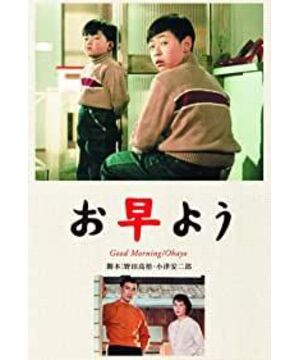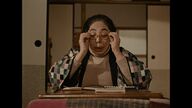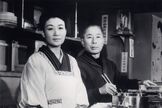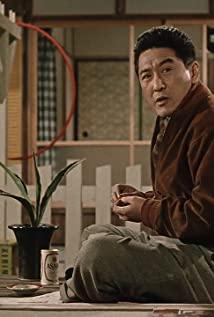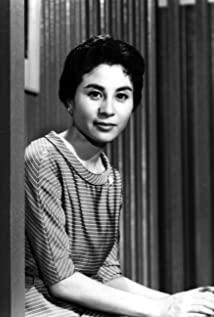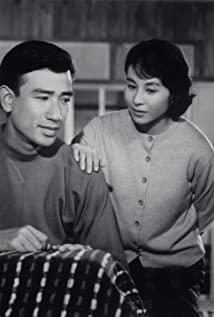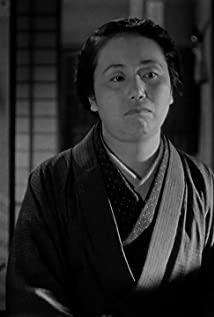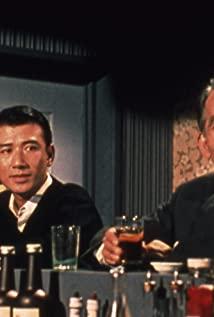However, in addition to this series of movies with similar themes, there is an alternative-"Good Morning". This life comedy completely put aside the heavier topics of marriage, elderly care, mother-in-law relationship, etc., and focuses its perspective on residents in the suburbs of Tokyo. , To concatenate the trivial things that happened here: misunderstandings and conflicts between neighbors, laughter and disputes within the family, etc., forming a relatively fresh breath, showing us the life of ordinary Japanese residents in that era. Gesture, as a comedy, the film mainly relies on the trivial entanglements between the housewives and the innocence of the protagonist’s two brothers to produce jokes. These active little people, with their sunrise-like enthusiasm, became the heroes behind the rise of Japan's economy. Because of Ozu's unique use and persistence of the lens, we can always see the "real" in his films, because his lens always stands there quietly, as quiet as a mirror. So what are the social phenomena that interest me in Japan in 59 years?
1. Salesman. With the rapid growth of material production materials, traditional business practices need to keep up with the pace of change. There must be a transitional period in between. In the gadgets promoted, there will be some interesting new things, such as the "home anti-theft bell" in the movie. ". These salesmen active in various residential areas have become spokespersons for the gradual enrichment of the commodity economy. In China in the 1980s and 1990s, we were not unfamiliar with such people. The "strategies" of several housewives in the film toward salesmen also reflect the views of ordinary residents on emerging consumption or marketing methods. There were too many contradictions between old and new things in society at that time. This is what everyone must face when experiencing the rapid development of society. This is similar to what we did in the 90s.
2. Japan was in the West in the 1950s. The most interesting thing is the phrase "I LOVE YOU" that my brother often said in the film. After the initial confusion and depression after the war, the new generation of Japanese young people seem to have an instant return in their attitude towards the Western world. It's the Meiji era. In the school, elementary school students read English with a strong accent. In the play, young people who are not working at home also use Japanese-English translation as a temporary means of earning a living. English songs are a symbol of popularity and fashion. However, although the trauma and frustration caused by war are still topics frequently mentioned by experiencers, the characters in Ozu’s movies often talk about the memories of war. A dialogue in "The Taste of Saury" may be his own views and views on war. Feelings (the protagonist and former wartime subordinates were drinking in a small bar, the background is the military song of the Japanese Navy):
"Why did we lose the battle? If we win, what will happen to Japan? Maybe now I am here New York, New York!"
"The young people nowadays worship foreigners, listen to their songs and dance their dances"
...
"I think it might be better if you are defeated."
"Yes, at least those fools can't. Domineering..."
Afterwards, the former subordinates happily danced a funny military salute dance in the small bar accompanied by the sound of military music, and the bar proprietress also echoed it.... Easy and ridiculous. After the war, it was just a thing of the past. Ozu is more willing to focus on the present and use simple words to express his attitude towards war clearly. This is the reflection of those who witnessed him calm down. In fact, even if Ozu was on the battlefield, he often showed something outside the war. In his record book "I am the one who opened a tofu shop, I only make tofu", Ozu also often aroused literary lovesickness against the ordinary scenes of foreign countries during fierce battles, and talked about the embarrassment caused by the war. And tiredness...
3. The atmosphere of the times. Excluding the artistic processing and rendering of the film itself, plus the trust in Ozu's lens, from "Good Morning" we can still experience the life style of the people at that time. Ten years after the war, life has gradually entered a state of healthy development, but no one dared to slow down. You are chasing after me and want to make a name for yourself in this new world. In the film, the neighbor is sad because of his retirement, and he is very happy to find a job as a salesman in the end. Although the young man is waiting for a job at home, he dare not slacken his efforts to support himself by helping to translate documents, but he still feels inferior to himself because he has no job. My sister is quite proud of her job in car sales. Even in the same residential area, the difference between the rich and the poor still exists. Among the four neighboring families in the film, except for one family that can buy a TV, the rest of the families are still looking to regress in new electrical appliances. Even "Fart" families will control their children's eating too much. At the same time, Ozu also showed the “new” lifestyle of a class of young people at the time: unmarried young couples living together lived a “lazy” enjoyable life, rented a house, did not have a serious job, but bought a TV early at home. Because I can’t get along with my neighbors (which conflicts with the mainstream positive and peaceful life attitude, the neighbors look down on them), and I plan to live in another place, which is a very "Westernized" and "liberalized" life. 10 years from here, to 69 years, is exactly the era when Watanabe lived in "Norwegian Forest", so when we come to understand the living conditions of his young people, we will have a better understanding. In short, the people of that era maintained a sense of worry and did not want to be forgotten by the wave of social development and chased each other forward.
4. Chat with adults. In the film, the two brothers began to mute because of the adult's reprimand. They complained that the adults around them always talked all kinds of nonsense. In life, work is always full of meaningless greetings. Once upon a time, our favorite when we met in Japan was the phrase: Have you eaten it? And in this film, it is the most often said in weekdays: "The weather is really good today" and "Good morning". When you don't know what to say, but you have to talk, this sentence: "The weather is really good" can temporarily relieve the siege. These seemingly meaningless exchanges have narrowed the distance between neighbors in every bit, and are a universal opening method for every in-depth communication. These "good weather" dialogues have appeared in many Ozu films, and this has almost become an obvious personal label for this "Japanese national life recording master" after trains, urban high-rise buildings, tatami mats, and drinking in a tavern. The faint feeling between the protagonist’s sister and the unemployed youth in the movie always makes us look forward to it. Compared to the other non-mainstream couple in the movie, they are really a suitable pair! But at the end of the film, the two of them were in front of the platform that is common in the day. When our audience expected their relationship to develop, the two of them still greeted "the weather is really good today"...
In addition, an interesting complaint. Point, Ozu’s employment habits make every family in the play a super-aged parent. In the 59 years when the film was shot, the protagonist Kasachi Chijo was 55 years old..... The other actors who played their parents were also in their 40s. In the play, their children basically only go to elementary school. In Ozu’s other movies, most of them are grandparents, or appear in a father-daughter relationship... "Aging parents", this is The most discordant place in this harmonious and interesting life-flow comedy movie... And the only positive effect of this difference may be to make the "tips" between the housewives in the play And acrid) become more in-depth. After all, this is a comedy. When the aunts talk about gossip, it is really more flavorful than young girls. The tip of the tooth is still the essence of the aunt!
View more about Good Morning reviews


